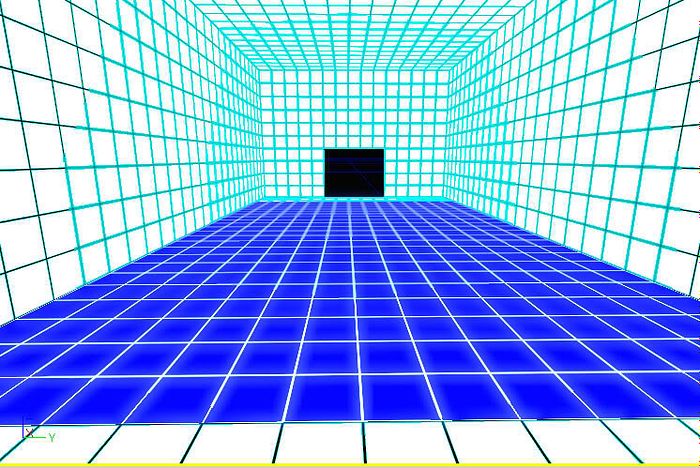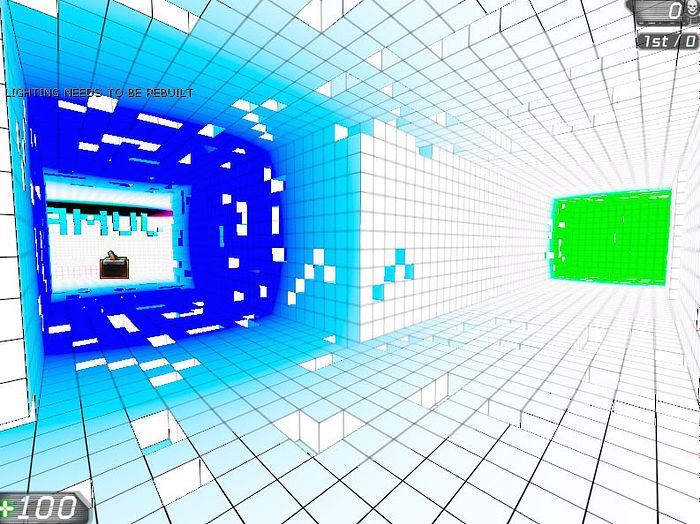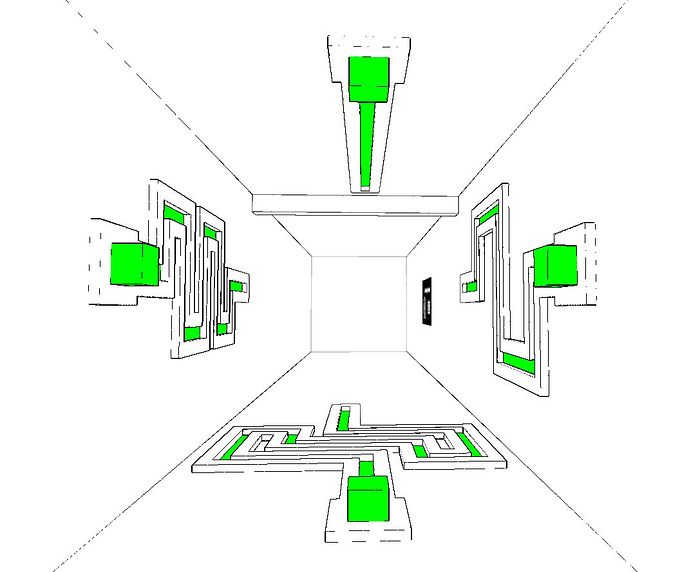

IGFNuovoLogo
A few days ago, the finalists for the 2011 IGF Nuovo award were announced, and my game, Hazard: The Journey Of Life, was one of them. The jury statement describes it as "a textbook example of a 'Nuovo' game for using all the "storming through corridors" conventions of the first person shooter to create a deeper examination of personal philosophy." Some people may be hearing about the game for the first time as a result of the nomination (after all, the game isn't done yet), and some people may believe that the nominations were easy to get (as though being "artsy" / unconventional was enough), but for myself and others, it's been a long road to get there. In my case, this is the second time that Hazard was entered into the IGF, and the results the first time weren't so pretty.
This post is a very long account of everything that took place leading up to this nomination, and I'm posting it for the benefit of those who are looking in from the outside, wondering what goes on behind the scenes for some of the games that make it into these competitions. After all, I was in exactly that position last year, when I was just starting to put myself out there. Unlike some other developers, I didn't come into this with years of industry experience and decent connections. I worked my way up from nothing, through sheer determination and effort. Needless to say, I wouldn't be where I am, were it not for gathering the advice of many people who had done it before, and finding out what it really takes.
 It's come a long way from this
It's come a long way from this
I first took notice of the IGF in late 2009. I'd seen it mentioned previously, but wasn't entirely sure what was so special about it. For most of 2009, I was actually more interested in Sense of Wonder Night and Make Something Unreal. I'd heard about Make Something Unreal back in 2004 when they were running the second competition, and I'd heard about Sense of Wonder Night in 2008, as a result of a friend showing me The Unfinished Swan. In both cases, I made passing comments to people about how "it would be cool to be in one of those some day", and as their deadlines kept getting closer, I began seriously toying with the idea of entering my game into them both. I figured that it wouldn't hurt (entry was free in both cases), and I was curious as to what made me any different to any of the other people who were selected for them. From March through to August last year, I ramped up from working on Hazard in my spare time to eventually working on it day in and day out for several months solid to get the game "completed". Before even entering Make Something Unreal at the end of August, I'd already received news that my SOWN entry was successful. Further on in the year, I also became finalist and grand finalist for Make Something Unreal, and I outright won another competition at Game Connect Asia Pacific.
After this chain of successes with my game, I set my sights on the IGF, and was feeling pretty over confident about it. Unlike for previous competitions, where my mindset was "it would be cool to be selected for this", my expectations for the 2010 IGF were more along the lines of "I wonder what I'll get nominated for". This attitude ended up leading to a pretty unhealthy obsession of wanting the results. I watched several years worth of IGF awards shows, went through a plethora of entries from 2010 to see what I was up against, and couldn't imagine what it would mean if I wasn't selected. I got to the stage where I couldn't really have a conversation with someone without mentioning it, because although I'd won other things, they weren't the IGF. At one stage my brother told me that he would have to move out of home, because things weren't working out for him at all, and my response was "I hope I get selected for the IGF". I didn't even acknowledge what he'd just said.
 The first lighting test for Hazard
The first lighting test for Hazard
The closer the deadline came, the more restless I became. On the day of the announcement, the episode of TIGRadio being aired was all about the IGF, with the first hour of the show being one big lead up to who had made it in. By the time the announcement finally came, my heart was racing. I eagerly scrolled through the results to see where my game was, and sure enough it was mentioned. It was an honourable mention for the 2010 Nuovo award, but it was not a finalist in any category. I had failed. The next 20 minutes were spent staring blankly out the window, listening to people on TIGRadio go crazy over the results. This is when I realized two things, that set the tone for the rest of the year. You can't take anything for granted, and setting unreasonable expectations hurts.
What followed was a roller coaster year of highs and lows. After having some more time to think about the announcement, I decided that there were other competitions to enter, and that I could always try again next time. To clear my mind a bit, I submitted an audio essay to the next episode of TIGRadio entitled "IGF 2010 - What Missing Out Means". The basic theme of my talk was that everything was okay, because maybe I'd still get selected for the student IGF or the Experimental Gameplay Workshop, and that maybe I'd win something in Make Something Unreal. When the Student IGF results were announced, I wasn't selected for that either, and the Experimental Gameplay Workshop was cancelled soon after. I then found out that I was one of the Grand Prize winners in Make Something Unreal, and also got invited to speak at the GDC as a result of the honourable mention. All of this was giving me some pretty mixed signals about the game, so I took the opportunity whilst at the GDC to talk to as many people as I could, and to try and work out where I'd gone wrong in the IGF.
 Experimenting with the aesthetic. Going overboard is part of the process.
Experimenting with the aesthetic. Going overboard is part of the process.
The feedback I'd received from the judges ranged from "a really enjoyable experience - clever concepts, well-done art, and a longform experimental title I can really get behind. Congratulations." to "I felt neither intrigue, enjoyment, nor satisfaction as a result of playing. There was just nothing compelling here to me." Anonymous feedback like this wasn't enough to really work out how far I had to go with the game before it was ready. I needed to meet as many other people as I could, and get their opinions about it all. One of the discussions that really stuck with me throughout the year was with Mare Sheppard (N / N+), who was on the Nuovo jury that year. She said "unfortunately at the end of the day, only one game could win, but your game received a lot of support from the judges, and I encourage you to not get discouraged and keep in mind the jury changes every year". She also said "it probably didn't make the finals only because of the sheer quantity of quality games entered this time around."
I left GDC feeling refreshed, and with a good idea of what kinds of things I had to fix with the game. My feelings were summed up nicely by another piece of judge feedback that said "a brave attempt to do something a bit different. While it doesn't really work as a "game", it's an interesting approach to an "art game"". Basically, I had a bunch of interesting concepts, but they didn't all gel together as nicely as they should have. Though I had done really well in Make Something Unreal, speaking with Epic later I realised that that was more because of how much I had bent the Unreal Engine away from what they'd expected than how much it worked completely as its own thing. People at Epic still enjoyed the game, but were more impressed with what I'd done to their technology.
 That's a bit better. Still way too busy.
That's a bit better. Still way too busy.
I later decided to try my chances again with IndieCade. I submitted early to ensure that I was eligible for the IndieCade @ E3 showcase, and was feeling really good about all of the changes that I had made. Unfortunately, I made the same mistake of building up expectations that my game would be selected, having looked through the selections from the previous year. When the day came for the finalist notifications, I heard nothing back. I knew they'd been sent out, because I could see other people talking about being selected on the internet. I felt pretty down about it all for a few days, but eventually decided to pick myself up again and shift focus to the next competitions. Just when I'd completely removed IndieCade from my mind, I got a very late notification that I was in fact selected, and had to be in Los Angeles the following week. As much as this was supposed to be news worth getting excited about, it left me feeling flustered and stressed at how little time I had been given to organise making my way there, and left me feeling very confused about the game again.
Though reactions to the game at E3 were very positive, I ended up returning home feeling more exhausted than when I'd left, and knew that there was still more to be done before the game was ready. Having spent months improving it significantly, this wasn't exactly the feeling I wanted to walk away with. Whilst trying to get myself back into a positive mindset about it all, I received a rejection notice stating that the game wasn't selected for the PAX10. To get over the disappointment from this, I convinced myself that I would surely be selected for IndieCade in October, given that I was part of the E3 showcase. But that didn't happen either.
 Minimal
Minimal
By this stage, I was physically getting sick from working on the game constantly. Any time spent while awake was spent at my computer working on the game, and any time spent away from my computer was spent being unable to sleep. My life was lacking balance, and at each monthly IGDA meeting I went to, I'd have more people comment on how tired I looked, until people started actually getting worried for me. Missing out on IndieCade put me at an all time low, and people at the next meeting would no longer let me brush off their concerns. They kept asking what was wrong, and eventually got me started on a passionate rant. I find ranting very therapeutic, as a way to take negative energy and throw it out into the aether.
I wasn't ranting about anything in particular. I just spoke about how tired I was getting, how there was always more work to be done, how much I was getting over being stuck in a room all day by myself working on something, wondering if it was all worth it. I couldn't stop, because that would be a waste of everything I'd done, but continuing seemed so hard. Needless to say, two hours of very passionate ranting got me back to having a smile on my face, feeling refreshed, and this marked a real turning point for me. During this rant, I made throw away comments like "I should just go to Japan again, because that was the most fun I've ever had". Thinking about it afterwards, I realised that this wasn't something that I should do, but something that I needed to do.
 Getting carried away after implementing freehand 3D drawing
Getting carried away after implementing freehand 3D drawing
I had to step away from the game, and decided that it would still be worthwhile going to IndieCade despite not being selected for the festival, because I was still part of the E3 showcase previously. Going to IndieCade would also give me a chance to catch up with people I'd met at the GDC again and talk about how things were going. I'd also go for a holiday in Japan afterwards, to completely unwind and recover. After finalizing all of my plans and paying for the trip, I was feeling ready to settle down for a bit and get back into a healthy mindset. I then received news that I would have to change my plans, because I also had to be in Texas for GDC Online for another competition, and that it overlapped with IndieCade.
In the very exhausted state I was in, this news left me feeling very mixed. It was definitely positive news, but I was still feeling rather sick from overworking myself, and this meant more work that had to be done to prepare for another conference. I really needed a break, but whenever I tried to step back and get myself into the right mental state, something would come up and I'd have to shift my focus again. This time it was for a competition with a grand prize worth $100,000. As nice as that sounds, that's also a very big unknown to have in your mind for several weeks. I tried not building any expectations, but when the overall winner was announced, I can't think of anyone who wouldn't have been disappointed for not winning. I brushed that off as fast as I could, because this trip was supposed to be about relaxing, not stressing. Despite not winning, the game was playtesting really well at GDC Online, and a lot of people were loving what they were seeing.
 Puzzles are always way too hard when you first create them
Puzzles are always way too hard when you first create them
I felt like I was far closer to having the game finished than I did after E3, and I spent the following days at IndieCade talking to as many people as I could again, just as I had done at the GDC. This time, however, some of the advice I was getting was very different. Daniel Benmergui (Today I Die) and Andy Nealen (Osmos) both told me that I was doing really well, but that I really needed to slow down, and find other things to worry about. That going to Japan for 2 weeks was not going to fix the real problem of being so mentally wound up within this game that I didn't have balance. Though I agreed with them, my time in Japan was still a catalyst for that change.
I got back from my trip feeling completely refreshed and ready to settle down. Though I'd entered other competitions, I wasn't going to wait for the results for them. I decided that at this point, the most important thing to me was to heed the advice of others and try and get balance back into my life. I needed to get myself back into a healthy routine - running every day, sleeping properly, maintaining a positive attitude, etc. After all, if I burned myself out entirely, I'd never finish the game. When I was notified that I had been selected for IGF China, I was genuinely happy about it. Though it was something I'd been interested in since speaking with Farbs soon after he won in 2009 with Captain Forever, I didn't allow myself to build any expectations about it. At GDC China, the game was playtesting even better than at GDC Online (having made more changes), and though I ultimately didn't win anything in the competition (and was naturally a little disappointed), the response towards the game from people at the pavilion was more important to me.
 Refinement. Less is more.
Refinement. Less is more.
Which brings us roughly back to now. Having read all of that, I realise that you could say "but at least your game got selected for things!" This is very true, but only because I entered absolutely everything. There were were also things that I missed, same as everyone else. The main point behind it all was that I never gave up believing in what I was doing, and kept finding ways to persevere and improve. Every nomination I received proved to me that what I was making was worthwhile to someone, and every nomination I missed was a way to say "it's not quite there yet." Even when you're working in a bedroom by yourself for months on end, and you get rejected from things several times, you just need to do whatever it takes to accept it, get back into a positive mindset, and move on. But ultimately, you also need balance. I'd worked myself sick, and needed others to teach me some perspective. Not getting selected for something is not the end of the world. Had I not received this nomination either, I'm now well beyond feeling like it was a make or break situation.
It's all too easy to look at other people that have been successful at what they were doing, and assume that they found it easy. That they didn't go through the same difficulties, disappointments or mental anguish. Even if you hear Jonathan Blow or Valve or whoever else you look up to say that it's a hard process, it's easy to believe that they were just better prepared for it, and that maybe you really are finding it harder than it should be. But success is never easy. Having been fired from a company that he started, only to later be rehired and become even more successful, Steve Jobs has wonderful advice about this:
http://www.youtube.com/watch?v=KuNQgln6TL0
Making something successful is really, really difficult. It's hard to stay motivated when you've worked on something for a long time, but the answer isn't to give up. The answer is to find out what you need to do to see it through. To remember why you started it in the first place, and to make sure that you achieve what you set out to do. I believe very strongly in what I'm doing. It's not even about how the game will sell when it's done, or how critics will review it. They're important, sure, but it's more about how I feel about what I'm doing, having invested years into it. Though I've now received the nomination I wanted last time, missing out on it last year was probably the best thing that could have happened, because it made me realise how much it was worth.
[Reposted from my blog, found here.]
About the Author(s)
You May Also Like








.jpeg?width=700&auto=webp&quality=80&disable=upscale)








